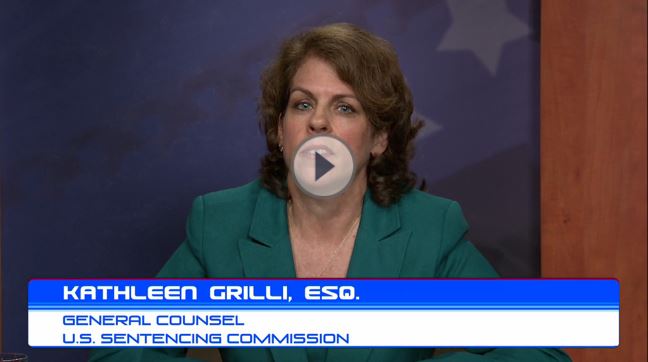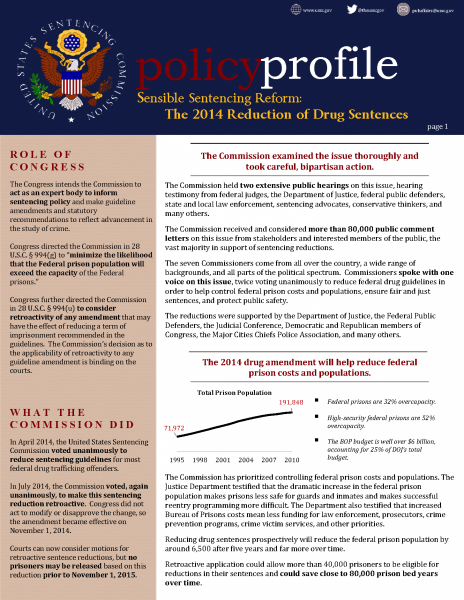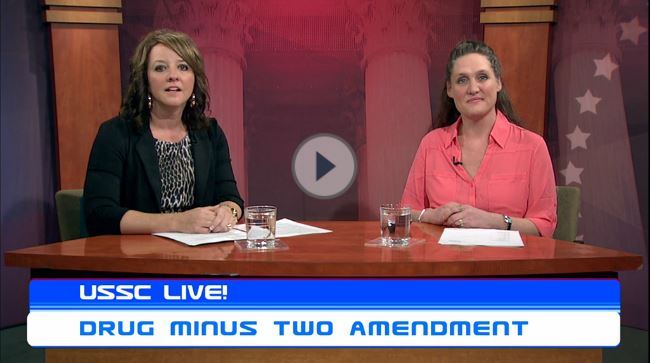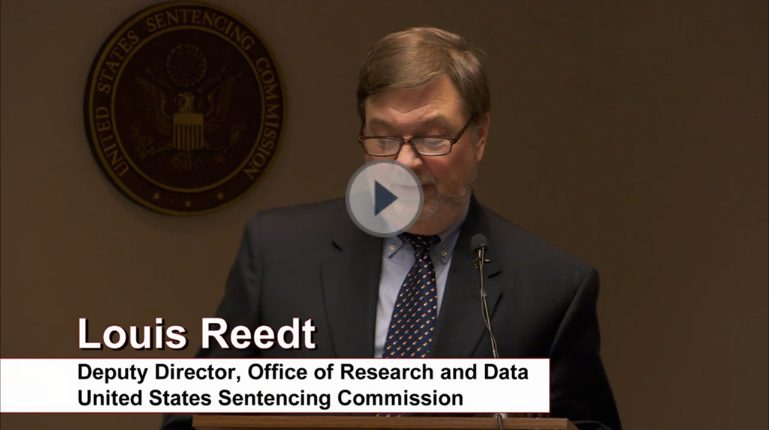Reducing the Drug Quantity Table by Two Levels

In April 2014, the United States Sentencing Commission voted unanimously to reduce sentencing guidelines for most federal drug trafficking offenders. In July 2014, the Commission voted, again unanimously, to make this sentencing reduction retroactive (effective on November 1, 2014). Courts can consider motions for retroactive sentence reductions beginning on November 1, 2014, but no prisoners may be released based on this reduction prior to November 1, 2015.
Amendment Language
- 2014 Amendments to the Sentencing Guidelines (Effective November 1, 2014)
- "Reader-Friendly" Version of Retroactivity Amendment
What did this amendment do?

The amendment reduced the sentencing levels associated with drug quantity in the advisory United States Sentencing Guidelines. Going forward, this change will reduce penalties by an average of 11 months for 70% of drug trafficking offenders. More than 40,000 currently imprisoned offenders could be eligible to have their sentences retroactively reduced by an average of 25 months. They would still serve an average of 108 months.
FAQs and Training Materials
The Commission's FAQ document answers common questions received from the public regarding the 2014 drug guidelines amendment. The legal primer addresses some common procedural questions that have arisen in the context of motions for sentence reductions under 18 U.S.C. § 3582(c)(2) and retroactive guideline amendments.
- Frequently Asked Questions Regarding 2014 Drug Guidelines Amendment
- Retroactivity Primer (August 2014)
View the webcast (recorded October 2014) discussing application of this amendment:
Materials from Public Meetings and Hearings
Public Meeting to Vote on Retroactivity (July 18, 2014)
The Commission voted unanimously at this public meeting to apply a reduction in the sentencing guideline levels applicable to most federal drug trafficking offenders retroactively, meaning that many offenders currently in prison could be eligible for reduced sentences beginning November 2015.
Public Hearing on Retroactivity (June 10, 2014)
The Commission gathered testimony from invited witnesses concerning whether the Commission should designate as retroactive the amendment reducing guideline levels for most drug offenses.
Public Meeting to Vote on 2014 Amendments (April 10, 2014)
The Commission voted at this public meeting to reduce the sentencing guideline levels applicable to most federal drug trafficking offenders.
Public Hearing on Proposed 2014 Amendments (March 13, 2014)
The purpose of this public hearing was for the Commission to receive testimony from invited witnesses on proposed amendments to the federal sentencing guidelines.
Public Meeting on Proposed 2014 Amendments (January 9, 2014)
At this public meeting, staff gave a data presentation to inform public comment on proposed amendments to the drug trafficking guideline.
Watch the data presentation on drug trafficking offenses:
Public Meeting on Proposed Priorities (August 15, 2013)
The Commission met to select priorities for the 2013-14 amendment cycle.
Public Comment
Additional Related Materials
Federal Register Notices
- Federal Register Notice of Final Action Regarding Amendment to Policy Statement §1B1.10 (Effective November 1, 2014)
- Federal Register Notice of Submission to Congress of Amendments to the Federal Sentencing Guidelines (Effective November 1, 2014)
- Federal Register Notice of Proposed 2014 Amendments to Federal Sentencing Guidelines, Policy Statements, and Commentary
Research on Retroactivity
- Retroactivity Report on 2014 Drug Guidelines Amendment (December 2015)
-
Updated Retroactivity Impact Analysis (July 2014)
- Original Retroactivity Impact Analysis (May 2014) *Prior to Implementation of Delayed Release Date
Court Related Materials on Retroactivity
-
Amicus Curiae Brief Filed by the United States Sentencing Commission
On March 3, 2010, the United States Sentencing Commission filed an amicus curiae brief with the Supreme Court of the United States in support of the United States in Percy Dillon v. United States, 09-6338.
- Supreme Court Case Law: Dillon v. United States
- Dillon Decision
Other Speeches, Remarks, and Press Releases
- Letter from the Federal Bureau of Prisons Director Charles E. Samuels, Jr. on Delayed Release of Offenders (November 2015)
- Article: "A Generational Shift for Drug Sentences," Chief Judge Patti B. Saris, Chair of the Commission, American Criminal Law Review (November 2014)
- News Advisory: Chief Judge Patti B. Saris, Chair of the Commission, Comments on Amendment to Reduce Drug Guidelines (October 31, 2014)
- In The News: The Wall Street Journal Publishes Letter to the Editor from Chief Judge Patti B. Saris, Chair of the Commission (May 7, 2014)
- Speech: "A Generational Shift for Drug Sentences," Chief Judge Patti B. Saris, Chair of the Commission, Georgetown University Law Center (March 26, 2014)
- News Advisory: Comment of Judge Patti B. Saris, Chair, U.S. Sentencing Commission on Senate Judiciary Committee's Bipartisan Vote to Report the Smarter Sentencing Act (January 30, 2014)
- Press Release: U.S. Sentencing Commission Issues Statement for Senate Judiciary Committee Hearing on Federal Mandatory Minimum Penalties (September 18, 2013).


